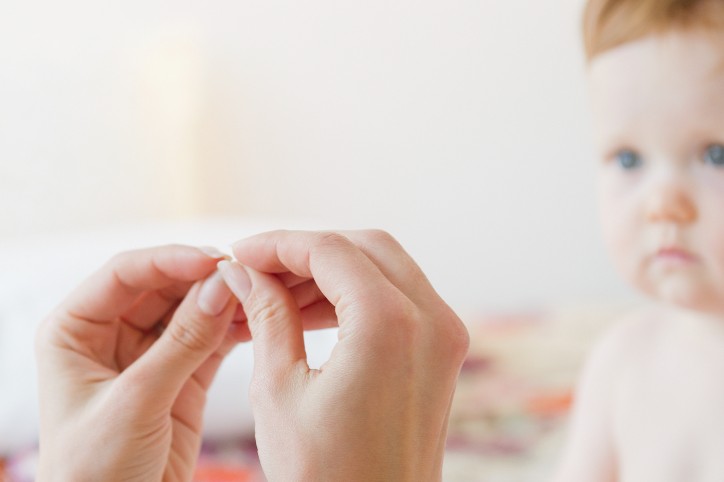Raising a toddler can sometimes feel like a never-ending game of guesswork. “When your little one is crying, are they hungry, thirsty, tired or do they simply need a diaper change?” says Annalise M. Colton, MS, CCC-SLP at Expressable. “How many times have you wished you could interpret those cries or get a peek inside their mind? That’s the very idea behind baby sign language (BSL)!” It can help your baby communicate their basic needs long before they’ve said their first words or are developmentally able to express themselves verbally. “BSL is a modified version of American Sign Language (ASL) that helps preverbal infants and toddlers communicate their thoughts.”
She goes on to say that infants as early as 6 months of age can begin learning BSL and when babies are regularly and consistently exposed to BSL, many can start using signs appropriately around 8 to 9 months. It’s also important to note that teaching your baby signs does not interfere with your baby’s language development. On the contrary, Colton says it actually promotes earlier communication. You can learn more about the benefits of teaching your baby signs here.
How to teach your baby signs
BSL was designed to be simple and fun and you can easily incorporate it into your daily routine.
“Chances are that your baby already understands more language than you realize,” says Colton. “When teaching your baby signs, it’s important to clearly say the word you’re referring to while demonstrating the sign. For example, to quell your baby’s thirst, you’d say ‘water’ and point to a cup of water while making the accompanying sign. There’s also the possibility that your infant may invent their own sign(s). Perfect! If that’s the case, start using those signs. At the end of the day, it doesn’t necessarily matter what the sign is so long as you and your baby both understand and agree on its meaning.”
Top 10 signs you can start teaching your baby today
ALL DONE: “This sign indicates that your baby is finished participating in whatever you’re doing at the moment. For example, if your baby is full, they can sign ‘all done’ to tell you to stop shoveling food into their mouth! To make this sign, start with your palms facing in and then turn your hands so they are facing out. Repeat this wave-like motion several times.”
MORE: “Find yourself routinely guessing if your baby wants more of something, like food or drink? To sign “more,” pinch your thumb and fingers together on both hands, creating two ‘O’ shapes, then bring your hands together a few times.”
WANT: “This is an important sign as it’s a stepping stone to helping your baby make requests! It also encourages more language output because after they make the sign, they need to actually indicate what they want. Place both hands in front of you with your palms facing up and fingers slightly outstretched. Then, pull the hands back toward you and slightly close your fingers. This sign looks like you are pulling something toward you.”
WATER: “If your baby is younger than 6 months, make sure to consult with your pediatrician before giving them water. The sign for water is made by extending your three middle fingers so they are pointing up, while your thumb and pinkie are tucked down. Then, tap your index finger to your chin. “
EAT: “As a mother, one of my worst fears is that my baby doesn’t have the tools to clearly communicate when they’re hungry. To sign ‘eat,’ take your dominant hand and form a squashed ‘O.’ Then tap your fingers to your mouth once. “
MILK: “This is a great sign for those who are breast-feeding or bottle feeding, helping your baby express when they want milk. The sign for milk is actually similar to how you’d milk a cow. Form a ‘C’ with your hand and close it. “
PLAY: “What better way for your baby to take initiative than to let you know they want to play! To make this sign, stick your thumbs and pinky fingers out, while curving the rest of your fingers into a fist. Then wiggle both hands in front of you.”
MOM: “Not going to lie, as a new mom myself, this is one of the signs I am most excited to teach my baby! It’s also a great way for your baby to start naming/labeling. Interestingly, all female signs (woman, female, grandmother, great-grandmother, aunt, cousin, sister, girlfriend, wife) are made around the mouth. To make this sign, spread your fingers apart, then have your pinky facing forward and tap your thumb to your chin. “
DAD: “As mentioned previously, this is a great way for your child to start learning how to name people in their life. All male signs (male, man, grandfather, great-grandfather, uncle, cousin, brother, boyfriend, husband) are made around the forehead. Make the same sign as you did for ‘mom,’ but tap your forehead.”
DIAPER: “How amazing would it be if your baby could replace crying or getting fussy with a simple sign to show they’re ready for a diaper change? To sign “diaper,” take both hands and place them down around your waist. Then take your index fingers and middle finger together from each hand and tap them on your thumbs.”
